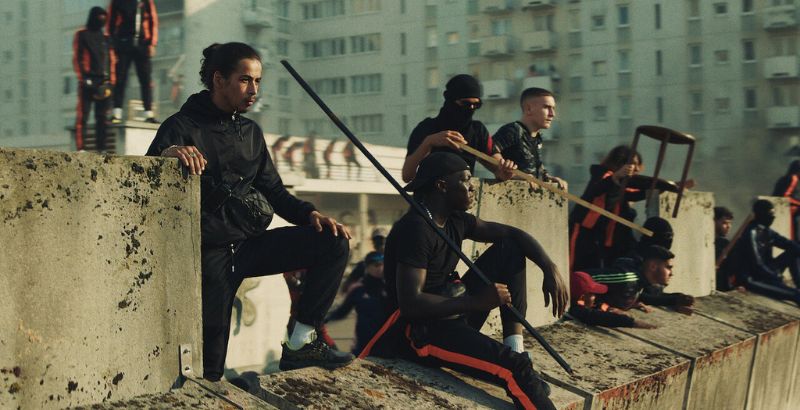
Athena, written by Elias Belkeddar, Romain Gavras, and Ladj Ly, and directed by Gavras, throws audiences into an uprising. In France, three brothers wind up on opposite sides of the conflict after their youngest brother dies under suspicious circumstances involving officers. Filled with explosive energy from the outset, with scenes seared into memory thanks to Romain Gavras directing, Athena shows the impact of justice denied.
Romain Gavras’ camera work is outstanding. I often do not notice directing; for me, it usually does not stand out enough to praise or criticize. But in Athena etches the shots, especially in the opening, into my memory. The closeup of Abdel (Dali Benssalah) as he speaks about his brother’s death and urges peace forces you to see Abdel’s conflicting emotions even as he regurgitates the words dissonant to his pain and anger. The one-shot of Abdel’s brother Karim (Sami Slimane) moving through a police station brings you into the fight as protesters loot supplies. The film is reminiscent of reporters following individuals amidst open conflict.
The opening, minus the imminent violence, is familiar. It is any one of the moments in the US where video footage surfaced of police brutality and the subsequent families of the victims pleading for calm. Mainstream media is little more than a mouthpiece, promoting propaganda and lies. So when the news claims suspicion is on a right-wing group, no one believes them.
Athena makes a decisive choice not to show the news; audiences only hear it and see the brothers’ reactions. It is all the same. They never address the root cause. Right-wing groups, especially in places like the US, not only move with their government and police blessing, officers are usually members of those organizations. A lie cannot increase tension that does not exist.
So the issues become more than one victim but scores of them, stretching back years. Every unheard case, each time officers’ actions are “justifiable,” builds rage—that rage stacks with each life gone until it is an inferno. The thing about infernos is they are near impossible to contain, and everyone winds up burned. Athena shows how one lost life becomes the match that sets their world ablaze.
Even with the superb directing, their leads have to bring the scenes to life, and this cast does. Dali Bensallah and Sami Slimane give impressive performances. They are the focus throughout most of the film; neither fails to deliver an unforgettable movie.
Religion also plays a role. While there is violence, riots, and people evacuating the conflict, Abdel rushes to his mother’s apartment to find Karim. Women line the hallway, offering condolences for his brother’s death, and before long, Abdel slows down as the pain returns. Despite all the violence outside, they are praying for his brother Idir. Though I am not religious, I appreciate how their faith and culture are so strong that it continues even in this situation. But also, this situation is probably not new for many of them. If violence brought religion and culture to a standstill, the only culture left would be the one in power.
The movie indicts the failure of so much: police, us vs. them, and the media. It is a tragic truth that change from power never comes with comfort or without a price. There are people waiting to exploit the tensions in society. Athena delivers a powerful, impactful film without feeling like trauma done for shock or inspiration, thanks to Gavras’ vigorous direction and commanding cast.
Athena is streaming now, exclusively on Netflix.
Athena
-
Rating - 7.5/107.5/10
TL;DR
The movie indicts the failure of so much: police, us vs. them, and the media. It is a tragic truth that change from power never comes with comfort or without a price. There are people waiting to exploit the tensions in society. Athena delivers a powerful, impactful film without feeling like trauma done for shock or inspiration, thanks to Gavras’ vigorous direction and commanding cast.




